Final Fantasy XI Chronicles, Part 1
The PlayStation 2 version of Final Fantasy XI is out in Japan, and we were eager to start playing this massively multiplayer online RPG. Read all about our first experiences.
Here is one of the most common questions that GameSpot readers have asked our editors over the past couple of years: "Is Final Fantasy coming back to the PC?" After all, this extremely popular, long-running Japanese role-playing series, which has been featured on the old Nintendo Entertainment System up through the current PlayStation 2, has appeared on the PC a couple of times in the past. The well-received Final Fantasy VII, followed by Final Fantasy VIII, have both in turn been brought to the PC. But ever since then, there's been nothing--two Final Fantasy games have been released for consoles but never announced for the PC, leaving PC gamers with little hope that the series would return to the computer. But Final Fantasy publisher Square surprised everyone when it announced that Final Fantasy XI would be coming to the PC as well as the PlayStation 2.
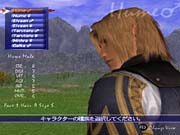
It's a natural fit. Final Fantasy XI is a huge departure for the series, which consists entirely of single-player role-playing games up till now: Final Fantasy XI has no single-player component to speak of but is actually a massively multiplayer online RPG. It's already available in Japan for the PlayStation 2, and a PC version is tentatively slated for release sometime next year.
When last year's Final Fantasy X was first released in Japan in July, publisher Square shipped (and sold) about 2 million copies in a single day. Final Fantasy XI, the first-ever online-only Final Fantasy game, was released on May 16 in Japan and shipped (and sold) a mere fraction of that. Requiring an expensive and currently hard-to-find hard drive, an Internet connection, and a monthly surcharge, and optionally a mouse and a keyboard, it's little wonder why Final Fantasy XI hasn't turned on as many gamers as some of its predecessors. As if the requirements for playing the game weren't already steep enough, the servers running Final Fantasy XI were plagued with problems at around launch time, preventing players from getting in and actually playing their new game. And causing Square to waive the monthly fee associated with its new PlayOnline service through June. In short, Final Fantasy XI is a bold experiment that isn't off to a particularly good start as far as the bottom line is concerned. In this respect, it's reminiscent of Square's ambitious 2001 film, Final Fantasy: The Spirits Within--a commendable undertaking but a commercial flop from the looks of things. Still, Square took a calculated risk with this new product, deliberately leveraging the good name of Final Fantasy to attempt to bring a new type of gaming experience to its legions of fans.
So now that it's finally out, how is it? That's what we're here to tell you. In this, the first of a number of ongoing reports chronicling our progress, we bring you preliminary details and the cold, hard facts on Final Fantasy XI, now that it's done and out there, costing people money.
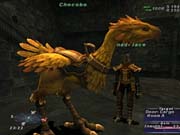
What we've found is a game that now seems to be running pretty smoothly and bears more than a passing resemblance to previously released massively multiplayer online role-playing games for the PC, such as EverQuest, Anarchy Online, Asheron's Call, and Dark Age of Camelot. The influence of these games on the design of Final Fantasy XI should be unmistakably apparent to anyone who's played any of them, yet Final Fantasy XI does have a unique gameworld, impressive visuals, and a number of original ideas that make it much more than just a clone. Furthermore, fans of Final Fantasy will find that Final Fantasy XI does bear the signature touches that all Final Fantasy games do.
We encountered some serious issues when trying to get the PlayStation 2 version of the game up and running. Installing the game to the PS2's hard drive, logging on to the servers, and patching up the program are decidedly new experiences in console gaming--but anyone who's played an MMORPG on the PC should be well familiar with all those things. So let's skip the sordid lead-up and get right to the meat of the game.
Beginning Life in Vana'diel
Character creation in Final Fantasy XI is a pretty straightforward process. There are five different character types to choose from: You can play as a male or female hume, essentially humans with well-balanced starting attributes. You can play as a male or female elvaan, which are nimble elflike characters with ears that stick way out. Elvaans are actually physically stronger than humes but aren't as apt in the magical arts. You can also play as a male or female tarutaru, tiny doll-like characters who make the best magicians in the game but are obviously lacking in strength. There's also the mithra, a female-only race of cat people, which is the most dexterous of all the starting races and thus make the best thieves. And then there's the galka, a male-only race of hulking ogrelike creatures with tails. One look at these guys and you know they're plenty strong.
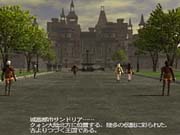
You can choose from a number of different faces and hair colors for each of the races, and as you decide, you'll see a real-time animation of one of the characters of that race, basically just lounging around. Each character type has his or her own theme, and interestingly, the female characters (except the tarutaru) can all be seen cavorting around, more like runway models than like adventurers.
You can name your character or have the game generate a random name for you, and you can also choose a starting profession, including warrior, monk, thief, white mage, black mage, and red mage. Fans of the Final Fantasy series should be well familiar with all these classes, and the entire job system in the game is reminiscent of that seen in Final Fantasy V as well as Final Fantasy Tactics. Whichever starting job you choose influences your character's core attributes and determines which sort of role you'll play on the battlefield, whether on the front lines dishing out damage or hanging back healing your comrades. The interesting, even innovative, thing about the job system is that you're not locked down to the particular job you choose--as in Final Fantasy V or Final Fantasy Tactics, when you play Final Fantasy XI, you'll have the option to change jobs and thus fundamentally change the type of character you're playing as.
There are also numerous other higher-level jobs that will become available as you gain experience, similar to the system seen in Dark Age of Camelot--jobs such as beast master, paladin, and dark knight.
Final Fantasy XI, like any Final Fantasy game or pretty much any massively multiplayer RPG, is fundamentally about working together in teams. Though some characters can effectively fight solo, especially at first, eventually you'll wish to befriend other characters, join up, and head out into the wilderness to explore, gain experience, and grow in power. Presumably, all the jobs were designed to support one another on the battlefield. A black mage and his destructive magic can be a force to be reckoned with, but especially so if he's got a warrior and a monk standing between him and his foes.
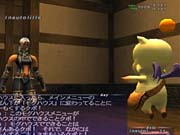
Of course, you don't just start fighting as soon as you enter into the world of Vana'diel. Actually, you currently have the option of choosing to begin in one of three starting cities. Each of these is a sprawling metropolis, filled with plenty of nonplayer characters and lots of room to walk around and socialize, as well as the typical amenities you'd expect from a Final Fantasy town. In our expedition, we noted a chocobo, an airship, and a moogle, among other things. We actually found these towns to be rather devoid of activity, each in turn. (Granted, we've been playing during off-peak hours.) We'd spot other players running about, but rarely did we see more than a few players around simultaneously. This gave city life a rather desolate feel, making us eager to get out of town and start fighting monsters--which seemed like a rather more exciting course of action than just running about city streets, trying to get used to controlling our character using just the left analog stick.
It wasn't long before we found the action we were looking for.
Taking Care of Beeswax
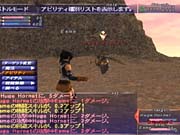
The influence of other online RPGs on Final Fantasy XI becomes most apparent when you engage in battle. Outside of town, you come across what are just like EverQuest's "newbie zones," frontier lands filled with wimpy monsters wandering around, just waiting for you to pound on them. Our character, a female hume monk named Esme, decided to get her hands dirty by taking on one of the many huge hornets buzzing about near town. To initiate combat, you just select a target and then select the "auto attack" option. Then your character and the opponent will exchange blows until one of you is dead. During combat, you can initiate any special attacks you have available, but as a newbie character, you'll have few, if any, of these to speak of.
The combat certainly looks good. Your view locks on the target, and you can adjust the camera angle for a more dynamic perspective. Your character assumes a fighting stance, and each time you hit, you'll hear a resounding thwack. Sometimes you'll hear your character utter a combat kiap. You'll also occasionally score critical hits, doling out even more damage than usual. Final Fantasy XI uses a skill-based system, meaning each time you do something, like throw a punch or swing a sword, you get slightly better at that ability. You also gain experience from defeating foes, and gaining levels gives you more hit points, making you able to take on more enemies. Early on, you can easily recover lost hit points by resting. Later you'll probably require the services of a white mage for quick recuperation.
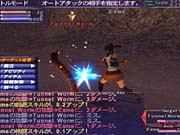
We'll be honest--most of our time with Final Fantasy XI thus far has been spent punching stuff to death. We've gone up a couple of levels, eager to fight something besides the same old hornets, worms, and bats. We haven't gone out of our way to socialize, partly because there aren't a lot of people around to socialize with, but also because solitary monks like us need no company. At least not yet.
To veterans of other online role-playing games: The experience of starting off playing Final Fantasy XI seems both very familiar yet also quite new. Certainly, the Final Fantasy name and the choice references to the series help make this game seem awfully exciting for dedicated series fans. Yet for those seeking the next big thing in online role-playing, it isn't obvious at first as to what Final Fantasy XI has that other currently available online RPGs don't, save for its good looks and its nice soundtrack. We hope this first look at Final Fantasy XI has given you a taste for what it's like to be playing the game, at least from a foreigner's perspective. And soon, as our monk grows in power, we'll fill you in on plenty more details about the job system, the world of Vana'diel, and how party-based combat actually plays out. And we'll be sure to spill any details on the PC version of the game in particular. Stay tuned.
Got a news tip or want to contact us directly? Email news@gamespot.com
Join the conversation